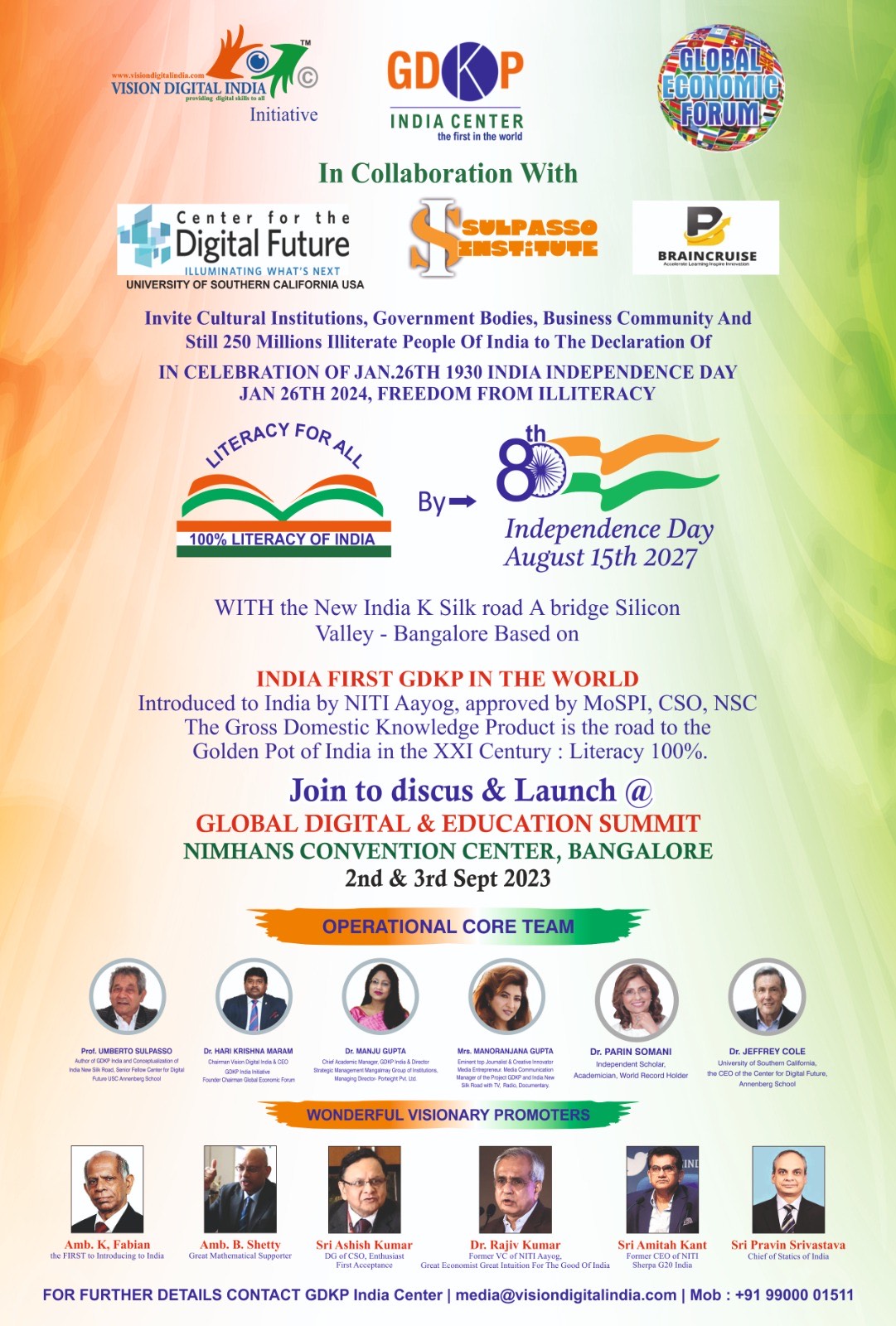What is GDKP
The idea of GDKP was propounded by Prof. Umberto Sulpasso of the University of Southern California with Prof. Jeff Cole of Centre For Digital Future Of Annenberg School Of University Of Sothern California. they spent past 17 years tracking digital developments across the globe professor Jeff Cole along with Professor Sulpasso make the GDKP one of their top priorities. It is Professor Sulpasso's long and fruitful relationship with India that has led the effort to begin the calculation of the GDKP with India. As per their Understanding that GDKP has global implications for the world and strong implications for India in understanding the progress of knowledge and learning.
The Gross Domestic Knowledge Product (GDKP) measures a nation's growth and future through four basic pillars:
- Knowledge items (Ki) - identification of both modern and local distinct culture knowledge items in distinct categories.
- Country's Knowledge Producing Matrix (CKPM) - comparison of knowledge produced by government, private institutions, and households as a differentiated way to impact on the GDP.
- Country's Knowledge User Matrix (CKUM) – the value of knowledge bought by individuals and private companies as a way to measure their modernization efforts.
- Cost of Learning – similar to the cost of living to be used as a political reference for government budgeting decisions through education family bonds, education credit card etc. to support young citizens.
GDKP in context to Indian Economy
It allows calculation of the value of specific Knowledge related to national culture produced and how these changed over a time.
In India, for examples, these specific knowledge items include the proliferation of cultural and religious teaching (yoga, Veda, and dance schools), religious festivals, and harvest festivals.
- GDKP can also facilitate the creation of a National Knowledge Education Platform. It will also enhance GDP and the proper role of private investment benefits.
The GDKP also measure the wealth of a country not only in material products as well as knowledge.
The GDKP Measures
- The values of objects that are considered standard knowledge items which includes production of newspapers, schools, patents, teaching, and a wide range of digital items.
- The value of specific knowledge items related to national culture which include the proliferation of cultural and religious teaching (yoga, Veda, and dance schools), religious festivals, and harvest festivals.
- The diffusion of knowledge items within the total population as a tool to evaluate future growth.
- The multiple effects of digital knowledge distributors on the population over a time through (fiber optic cable, learning platforms, satellites, and other digital educational tools).
- Comparison of knowledge and the value of knowledge bought by individuals as a measure of individual's perception of modern way to produce wealth.
- The value of knowledge acquired by private companies as a way to measure their modernization efforts, which is reflected in the Country Knowledge User Matrix.
- The cost of learning for individuals as a political reference for government budgeting decisions to support young citizens.
- The cost of investing in knowledge for sectors of the economy as a government budgeting decision to favor fiscal policy to modernize a country.
Outcome of GDKP
Knowledge is by far the most strategic element for globalization in the information technology revolution and the digital economy.GDKP contribute to a country’s knowledge, appreciating potential economic growth. It create a total new risk evaluation of international financing useful for World Bank,, IMF, and other big financial institutions.
Operational Core Team
- Prof. Umberto Salpasso, Inventor of Gross Domestic Knowledge Product model of India (GDKP-India), Senior Fellow Digital Center for Future, Annenberg School of University of Southern California
- Dr. Hari Krishna Maram, Chairman Vision Digital India & CEO GDKP India Initiative
- Dr. Manju Gupta, Chief Academic Manager, GDKP India & Director Strategic Management Mangalmay Group of Institutions, Managing Director- Porteight pvt ltd
- Mrs. Manoranjana Gupta, Head Media Manager
- Dr,. Jeff Cole, University of Southern California, the CEO of the Center for Digital Future, Annenberg school
- Dr. Parin Somani, Independent Scholar, Academician, World Record Holder
Important Link
Amitab Kant , previous CEO of NITI,
WHY NITI WANTS INDIA TO BE THE FIRST COUNTRY FOR GDKP, video
Launching HUB of GDKP INDIA by Dr. Manju Gupta at IMS conference
Hari Krishna Maram, CEO of Vision Digital India
THE IMPORTANCE OF SULPASSO’S MODEL FOR THE GDP OF INDIA, video
Presentation of Concept of GDKP by VC of NITI Dr. Rajiv Kumar at University of Rome
Presentation of Usefulness of GDKP India by Amb. Kalarickal P. Fabian at Los Angeles Conference
Presentation of Specific relevance for INDIA of GDKP, by Amb. Balakrishna Shetty at Los Angeles Conference
Presentation Statistic innovation to GDP from GDKP by former DG of CSO Shri Ashish Kumar at Los Angeles conference

